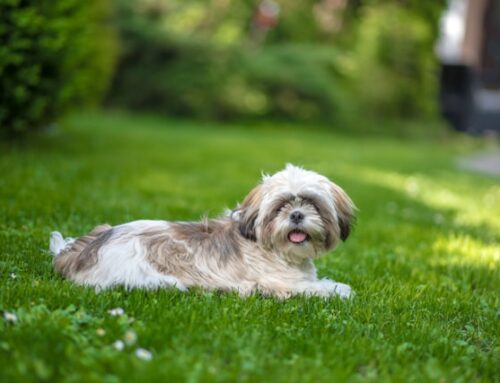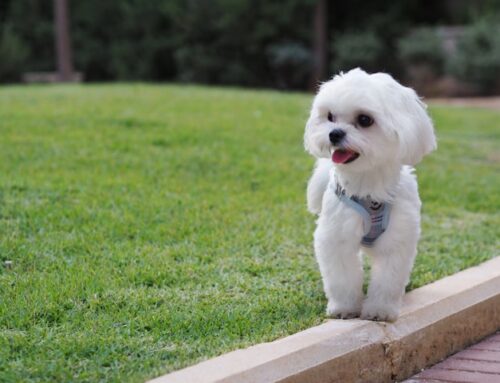Overview
Introduction to Full Grown Goldendoodle
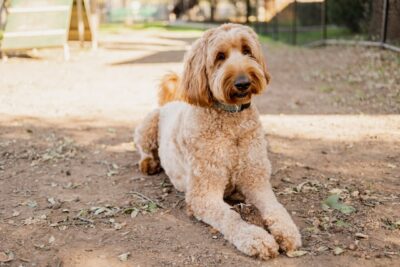
Goldendoodles have quickly become one of the most beloved and sought-after dog breeds. Their adorable appearance, friendly nature, and intelligence make them excellent companions for families, individuals, and even service dog work.
However, understanding the full-grown Goldendoodle, including their size, care needs, and unique characteristics, is essential for potential owners to ensure they are the right fit for their lifestyle.
In this comprehensive guide, we'll delve into everything you need to know about Goldendoodles, from the different sizes like the mini Goldendoodle, medium Goldendoodle, and standard Goldendoodle, to their care requirements and distinctive traits.
Whether you're considering adding a Goldendoodle puppy to your family or simply want to learn more about dog breeds, this guide is your go-to resource for all things Goldendoodle.
Brief overview of Goldendoodles
Goldendoodles are a popular first-generation hybrid breed, bred by crossing Poodles with Golden Retrievers. They are often referred to as "doodles" due to their Poodle lineage.
Goldendoodles come in various sizes, including mini Goldendoodles, and inherit traits from both parent breeds. Known for their friendly and intelligent nature, Goldendoodles make wonderful family pets with a lifespan typically ranging from 10 to 15 years.
Importance of understanding a Goldendoodle's full grown size
Understanding a Goldendoodle's full-grown size is crucial for potential owners as it helps in choosing the right size variant that fits their lifestyle and living space. Since Goldendoodles are a first-generation hybrid breed, their size can vary based on the Poodle lineage.
Mini Goldendoodles are smaller, making them ideal for smaller living spaces, while medium-sized Goldendoodles offer a balance between size and energy levels. Standard Goldendoodles, larger in size, are suitable for those looking for a larger canine companion.
Knowing the different sizes of Goldendoodles helps in selecting the perfect match for a family's needs and preferences.

Goldendoodle Sizes: Size Varieties of Full Grown Goldendoodles
Standard Goldendoodle Size
Standard Goldendoodles are the largest size variety of this popular breed, typically weighing between 50 to 90 pounds and standing 20 to 24 inches tall at the shoulder.
They are a result of crossing a standard Poodle with a Golden Retriever, inheriting the larger size from their Poodle parent.
Standard Goldendoodles are known for their friendly nature and make excellent family pets, especially for those with ample space for a larger dog.
Mini Goldendoodle Size
Miniature Goldendoodles, the smallest size variety of this breed, typically weigh between 15 to 35 pounds and stand 13 to 20 inches tall at the shoulder. They are a cross between a Miniature Poodle and a Golden Retriever, inheriting the smaller size from the Poodle parent.
Mini Goldendoodles are well-suited for smaller living spaces and are known for their friendly and affectionate nature, making them wonderful companions for families and individuals alike.
Toy Goldendoodle Size
Toy Goldendoodles are the smallest size variety of Goldendoodles, typically weighing less than 15 pounds and standing under 13 inches tall at the shoulder. They are a cross between a Toy or Miniature Poodle and a Golden Retriever, inheriting the small size from the Poodle parent.
Toy Goldendoodles are well-suited for apartment living and are known for their loving and playful nature, making them great companions for individuals or families looking for a small, affectionate dog.

Factors Affecting Full Grown Goldendoodle Size
Genetics
Genetics play a significant role in determining the size of a full-grown Goldendoodle. Factors such as the size of the parent dogs, whether they are medium, miniature, or standard Goldendoodles, can influence the size of the offspring.
Additionally, male Goldendoodles tend to be larger than female Goldendoodles. While genetics are a primary factor, other aspects, including diet, exercise, and overall health, also contribute to the final size of a Goldendoodle.
Parental breeds (Golden Retriever and Poodle)
The size of a full-grown Goldendoodle can be influenced by the sizes of its parental breeds, the Golden Retriever and the Poodle. For instance, if the Golden Retriever parent is smaller and the Poodle parent is a standard size, the Goldendoodle may fall somewhere in between.
Understanding the sizes of the parental breeds, whether they are medium, miniature, or standard, can give a general idea of the potential size range for a Goldendoodle.
Diet and exercise
The diet and exercise regimen of a Goldendoodle can significantly impact its full-grown size. A balanced diet and regular exercise, including outdoor time, can help maintain a healthy weight and promote proper growth.
Additionally, a more stringent training protocol, with more intensive training, can contribute to the overall health and size of the Goldendoodle. Understanding these factors and incorporating them into your Goldendoodle's routine can help ensure they reach their full potential size.
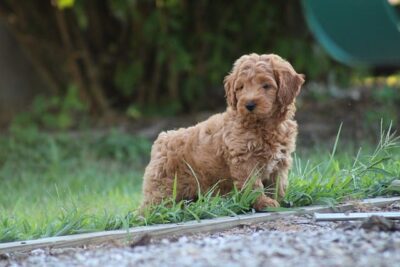
Growth Stages of a Goldendoodle
Puppyhood: Birth to 1 year
During the puppyhood stage, which lasts from birth to about 1 year old, Goldendoodles experience rapid growth and development. They can grow significantly in this period, typically reaching their full height by around 9 months old and continuing to fill out until they are about 1 year old.
A healthy Goldendoodle puppy can grow to be between 13 to 24 inches tall and weigh anywhere from 15 to 35 pounds, depending on the size variety and genetics.
This growth stage is crucial for their development, and providing proper care, including a balanced diet and regular veterinary check-ups, is essential for their well-being.
Adolescence: 1 year to 2 years
During adolescence, which typically lasts from 1 year to 2 years old, Goldendoodles continue to grow and develop, although at a slower pace than during puppyhood.
Miniature Goldendoodle may reach their full height by around 1 year old but can continue to fill out until they are about 2 years old. Medium Goldendoodle and standard Goldendoodle may take longer to reach their full size, with some continuing to grow until they are 2 years old or slightly older.
Understanding the growth stages of your Goldendoodle can help you provide appropriate care and training during this important developmental period.
Full Grown: 2 years and beyond
In the full-grown stage, which begins around 2 years old and beyond, Goldendoodles have reached their adult size and weight.
Miniature Goldendoodle typically weigh between 15 to 35 pounds and stand about 13 to 20 inches tall at the shoulder. Medium Goldendoodles weigh between 30 to 45 pounds and stand about 17 to 20 inches tall at the shoulder, while standard Goldendoodle weigh between 45 to 100 pounds and stand about 20 to 24 inches tall at the shoulder.
Understanding the full-grown size of your Goldendoodle can help you provide the appropriate care and lifestyle for their needs.
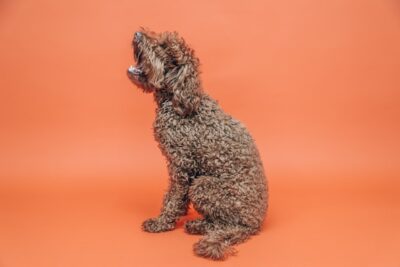
Physical Characteristics of Full Grown Goldendoodles
Coat types (curly, wavy, straight)
Full grown Goldendoodles can have a variety of coat types, including curly, wavy, or straight, which they inherit from their Poodle and Golden Retriever parent breeds.
Their coats require consistent grooming, including regular brushing to prevent matting and tangling. Depending on the coat type, daily brushing may be necessary to maintain a healthy and neat appearance.
Coat colors (golden, cream, apricot, red)
Full grown Goldendoodles come in a range of coat colors, including golden, cream, apricot, and red, reflecting their Golden Retriever and Poodle heritage.
These colors can vary widely within the breed, with some dogs having solid coats while others may have a mix of colors.
Facial features and body structure
Full grown Goldendoodles typically have a teddy bear-like appearance, with a broad head, expressive eyes, and floppy ears.
Their bodies are well-proportioned and athletic, with a sturdy build that reflects their hybrid vigor.
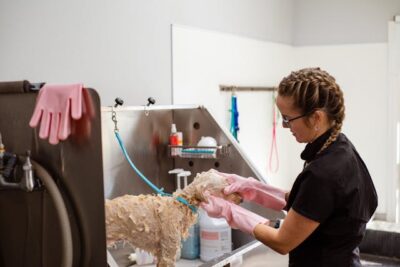
Care and Maintenance for Full Grown Goldendoodles
Grooming requirements
Full grown Goldendoodles require regular grooming to keep their coat healthy and free of mats.
Depending on the coat type, they may need regular brushing and occasional trimming to prevent matting. Some owners choose to take their Goldendoodles to a professional groomer for regular grooming sessions.
Exercise needs
Full grown Goldendoodles, like other dog breeds, have varying exercise needs that depend on factors such as age, size, and health.
Providing them with regular exercise, such as walks or playtime, is essential to keep them physically and mentally stimulated.
Considerations such as outdoor space, training considerations, and understanding their energy levels can help ensure they get the right amount of exercise to stay healthy and happy.
Nutritional considerations
Providing them with high-quality dog food, appropriate portion sizes, and regular access to fresh water is essential for their health.
Consulting with a veterinarian for guidance on their nutritional needs can help ensure they receive the proper nutrients to thrive.
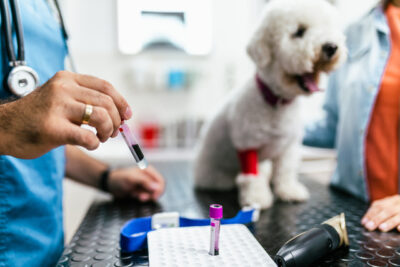
Health Issues Common in Full Grown Goldendoodles
Hip dysplasia
Hip dysplasia is a common health issue in full grown Goldendoodles, often inherited from their parent breeds, the Golden Retrievers and Standard Poodles.
It occurs when the hip joint doesn't develop properly, leading to discomfort and mobility issues.
Regular veterinary check-ups and monitoring can help manage hip dysplasia and ensure your Goldendoodle's health and well-being.
Ear infections
Goldendoodles, like many other breeds, are prone to ear infections due to their floppy ears that can trap moisture and debris, creating a favorable environment for bacterial or yeast overgrowth.
Regular ear cleaning and grooming, along with veterinary check-ups, can help prevent and manage these infections, ensuring your Goldendoodle stays healthy and happy.
Allergies
Goldendoodles are known to be susceptible to allergies, which can manifest as skin irritation, itching, and ear infections.
Identifying and avoiding allergens, along with regular grooming and veterinary care, can help manage these allergies and keep your Goldendoodle comfortable and healthy.
Cancer risks
Like many breeds, Goldendoodles can be at risk for certain types of cancer, including lymphoma, hemangiosarcoma, and mast cell tumors.
Regular veterinary check-ups and a healthy lifestyle, including a balanced diet and regular exercise, can help reduce the risk of cancer and ensure early detection if it does occur.
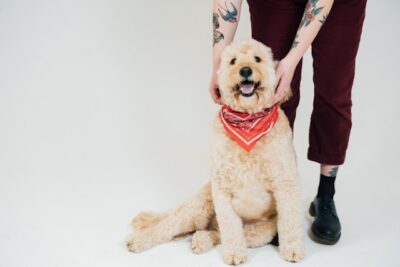
Behavioral Traits of Full Grown Goldendoodles
Temperament and personality
Goldendoodles are known for their friendly and affectionate nature, making them great companions for dog owners of all ages.
Their intelligence and eagerness to please make them relatively easy to train, whether as a new puppy or an adult dog. Goldendoodles get along well with children and other pets, making them a popular choice for families.
Intelligence and trainability
Goldendoodles are known for their intelligence, which makes them highly trainable pups. While they can be energetic and playful, they also enjoy long naps, especially as puppies.
Their intelligence and trainability make them a joy to teach and interact with, creating a strong bond between doodles and their owners.
Socialization needs
Full-grown Goldendoodles have moderate to high socialization needs, enjoying the company of both humans and other dogs. Proper socialization from an early age helps them develop into well-adjusted dogs, comfortable in various social settings.
Regular interactions, such as walks in the park or visits to dog-friendly areas, can help meet their socialization needs and ensure they remain friendly and sociable.

Living Arrangements for Full Grown Goldendoodles
Suitable home environments
Medium and miniature Goldendoodles are adaptable and can thrive in various living spaces, including apartments or houses. They are well-suited for both urban and suburban environments. While they are not as large as standard doodles, they still require regular exercise and mental stimulation.
A living space that provides enough room for them to move around comfortably, such as a slightly larger apartment or a house with a fenced yard, is ideal for a Goldendoodle pup.
Indoor vs. outdoor living
Goldendoodles are adaptable to both indoor and outdoor living arrangements, but they thrive best indoors with their families. They are affectionate and social dogs that enjoy being part of the family activities, making them well-suited for indoor living.
However, they also benefit from outdoor time for exercise and mental stimulation, so access to a secure outdoor space is ideal.
Compatibility with children and other pets
Full-grown Goldendoodles are known for their friendly and gentle nature, making them highly compatible with children and other pets.
They often form strong bonds with their human family members and enjoy the company of other animals, making them a great addition to multi-pet households. Proper socialization and supervision are key to ensuring a harmonious relationship between Goldendoodles and children or other pets.
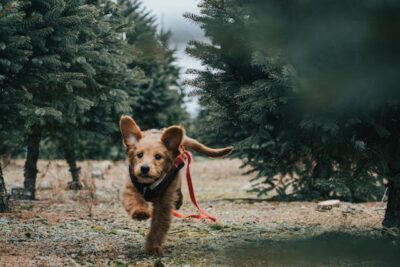
Training Tips for Full Grown Goldendoodles
Basic obedience training
Basic obedience training is essential for full-grown Goldendoodles to ensure they are well-behaved and responsive to commands.
Positive reinforcement techniques, such as treats and praise, work well with Goldendoodles, as they are eager to please. Consistency and patience are key when training Goldendoodles, as they can be sensitive to harsh treatment.
Leash training
Leash training is important for full-grown Goldendoodles to ensure they walk calmly and safely on a leash. Start by introducing the leash gradually, allowing your Goldendoodle to get used to wearing it before attempting walks.
Use positive reinforcement, such as treats and praise, to reward good behavior and encourage walking politely on the leash.
Positive reinforcement techniques
Positive reinforcement techniques, such as using treats, praise, and toys, are highly effective for training full-grown Goldendoodles. These dogs are eager to please, so rewarding good behavior with positive reinforcement helps reinforce desired actions.
Consistency and patience are key when using positive reinforcement, as it helps build a strong bond between you and your Goldendoodle while encouraging the desired behaviors.
Conclusion Full Grown Goldendoodle
Recap of key points about full grown Goldendoodles
- Goldendoodles come in various sizes, including standard, medium, miniature, and toy, with sizes ranging from 15 to 100 pounds and 13 to 24 inches tall at the shoulder, depending on the breed variant.
- Understanding their full-grown size is crucial for choosing the right size variant that fits your lifestyle and living space.
- Full grown Goldendoodles have moderate to high socialization needs and enjoy the company of both humans and other dogs.
- They require regular grooming, exercise, and proper nutrition to maintain their health and well-being.
- Training techniques such as positive reinforcement are effective for teaching obedience and leash manners.
- Health issues common in full grown Goldendoodles include hip dysplasia, ear infections, allergies, and cancer risks.
- Traveling with full grown Goldendoodles requires proper accessories and planning for safe and comfortable journeys.
Final thoughts on caring for and enjoying life with your full grown Goldendoodle
Caring for a full grown Goldendoodle involves providing them with love, attention, and proper care to ensure they live a happy and healthy life.
Understanding their size, socialization needs, grooming requirements, and training techniques is essential for being a responsible pet owner. With the right care and attention, your full-grown Goldendoodle can be a loyal and loving companion for many years to come.
If you're considering adding a Goldendoodle to your family or looking for a new furry friend, our website offers Goldendoodle puppies for sale in Georgia and surrounding areas. Our puppies are thoughtfully bred from reputable breeders, ensuring they are healthy and well-cared for from day one.
We value and adore each charming canine in our care, providing regular health checks, socialization, and affectionate interaction. We guarantee that the puppy you receive will meet your expectations.
Explore our delightful selection of Goldendoodle puppies for sale in Georgia, where each furry friend is raised with love and care to become a cherished addition to your family. Visit our website to find your perfect match.
FAQs About Full Grown Goldendoodles
- Q: What are Goldendoodles?
- A: Goldendoodles are a crossbreed between a Golden Retriever and a Poodle. They are known for their intelligence, friendly nature, and hypoallergenic coat.
- Q: What sizes do Goldendoodles come in?
- A: Goldendoodles come in various sizes, including mini Goldendoodles, medium Goldendoodles, and standard Goldendoodles. The size of a Goldendoodle can vary based on factors such as the size of the Poodle parent and the breeding process.
- Q: Do Goldendoodles shed?
- A: Goldendoodles are known for their low to non-shedding coat, making them a great choice for people with allergies.
- Q: Are Goldendoodles good with children and other pets?
- A: Yes, Goldendoodles are typically very friendly and get along well with children and other pets.
- Q: Do Goldendoodles need a lot of exercise?
- A: Goldendoodles are energetic dogs that require regular exercise to stay healthy and happy. Daily walks and playtime are recommended.
- Q: Are Goldendoodles easy to train?
- A: Yes, Goldendoodles are intelligent dogs that are usually easy to train. Positive reinforcement techniques work best with this breed.
- Q: How big do Goldendoodles get?
- A: The size of a full-grown Goldendoodle can vary depending on the size of the Poodle parent and other factors. Mini Goldendoodles are typically 15-30 pounds, while standard Goldendoodles can weigh 50-90 pounds or more.
- Q: Do Goldendoodles make good guide dogs?
- A: Yes, Goldendoodles are often used as guide dogs due to their intelligence and trainable nature.
- Q: Where can I find reputable Goldendoodle breeders?
- A: It's important to research and find a reputable breeder when looking for a Goldendoodle puppy. Look for breeders who prioritize the health and well-being of their dogs.
- Q: How do I care for a full-grown Goldendoodle?
- A: Caring for a full-grown Goldendoodle includes regular grooming, exercise, and proper nutrition. Regular veterinary check-ups are also important to ensure their health.
- Q: Do Goldendoodles get along with larger dogs?
- A: Goldendoodles are typically friendly and get along well with dogs of all sizes, including larger dogs.



